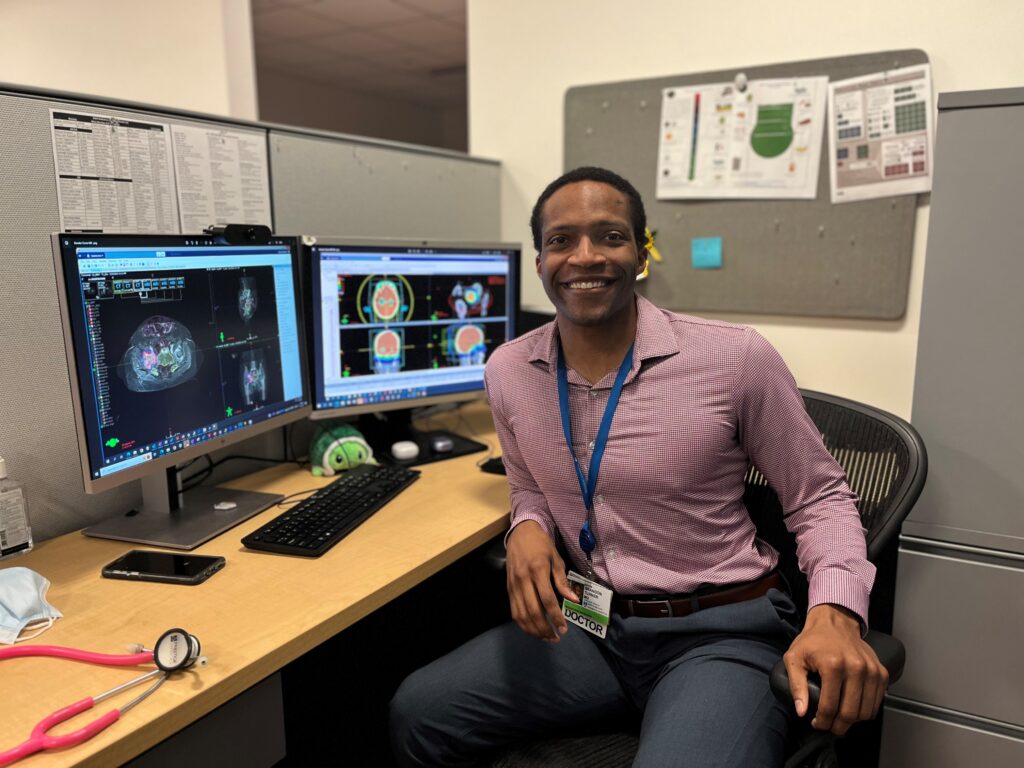Alumni Spotlight – Brandon Turner
While an undergraduate student at Wake Forest University, Dr. Brandon Turner was drawn to physics because of its ambition to explain phenomena at both the sub-atomic and cosmological scales. Now he is a fourth year resident in the Harvard Radiation Oncology Program. Professor Freddie Salsbury discusses with Dr. Turner his career path and how the Department of Physics helped him to find his passion for medicine.

Prof. Salsbury: What are you doing now career-wise?
Dr. Turner: I am a physician but still in training for my specialty. Specifically I’m a 4th year resident in the Harvard Radiation Oncology Program, which means that I train at a few different hospitals. I will finish my training in 2024.
Prof. Salsbury: What did you do right out of Wake Forest?
Dr. Turner: I went to Oxford to get a masters in Radiation Biology. It was a somewhat new department when I started but already had some wonderful people. I liked the coursework because it brought together a lot of biology and physics around the effects of radiation on biological systems. It was fun to see the range of scientists and policymakers interested and engaged in this work. On the one hand you had the basic science work, which I participated in as a member of the Tim Humphrey Lab. I was working with human cells and irradiating them with a cobalt source to understand some of mechanisms that cells use to repair DNA damage and how this behavior differs in cancers or when receiving concurrent chemotherapies. On the other hand we got to visit people in the UK government involved with radiation defense on a population level, people who were thinking about how to handle mass exposure events associated with nuclear reactors, war, or terrorist events. I stayed another year after that to do some research with Thomas Smith’s group which was a bit more of a pivot, looking more at the physiological effects of high altitude. Tom is a physician-scientist and by this stage I knew I wanted to go to medical school and wanted to work with a clinician. This might be able to passively strengthen patients who are mostly immobile, similar to how athletes might train in the mountains to get stronger.
Prof. Salsbury: How did Wake Forest Physics help you get where you are today?
Dr. Turner: Like many college students I didn’t know exactly what I wanted. I knew that I liked science and I liked math and I liked analytical thinking, and this made physics a rather natural and fun fit for me. I chose to go into medicine because I wanted to have a more direct connection between my day-to-day work and the people it impacted, but it was hard to let go of my original dream of becoming a professor. When I decided to go to medicine, I messaged a lot of my professors to ask if they knew which area of medicine had the most physics. Unanimously I was told Radiation Oncology and that was how I ended up wanting to be in the field that I’m now training for. It’s a unique field, we work closely with medical physicists and actually have to take a separate board exam just on radiation physics. I actually really enjoy the human part of the job, caring for patients with cancer is a privilege and you form a really unique. A lot of my peers sort of dread the physics part of the job but I must say I find it rather enjoyable. Along the way I’ve done a lot of research. The topics have ranged a lot but the common thread has been combining quantitative methods with some sort of domain knowledge or model to extract insights that help people to make decisions. I started at Wake with our biophysics folks as part of the Jacque Fetrow’s lab but it still serves me even outside of a formal physics department.
Prof. Salsbury: Do you have an anecdote you would care to share either from your time at Wake Forest physics or from afterward relevant to Wake Physics?
Dr. Turner: Hah, there are many. One that stands out was actually very early on. I remember one of the early physics courses for majors was mechanics, PHY 262 with Prof. Fred Salsbury. It was a fun course and Prof. Salsbury has a rigorous style and I remember it was the first class I took where the problem sets were sometimes challenging enough that most of us would get together in teams and try to pound it out together. I’d never done anything like that before. I think one of the best parts of Wake Physics is the people it attracts, and as a student it was the initial hard classes that really break the ice to get you working closely together.
Prof. Salsbury: Is there anything you would like to share with prospective or current students?
I don’t think I truly appreciated how well-respected a physics degree is around the world and across different disciplines. I chose it because I thought it was cool. I loved the scope of physics in its ambition to explain phenomena at both the sub-atomic and cosmological scales. You can really take that to any area of science and practically have something to offer. In my case I was drawn to biology and medicine. But what I didn’t realize is that some of the doors physics opened for me was less because of the practical utility of my physics knowledge and more about others’ belief that physicists bring a combination of rigorous thinking, comfort with quantitative analysis, and the ability to make pragmatic abstractions which is both unique and broadly useful across different professions. So even if you don’t end up applying as much pure physics in your day-to-day work as you originally imagined, the skills built by studying physics are highly useful.
